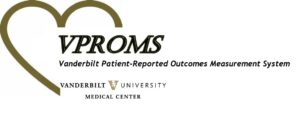Vanderbilt Patient-Reported Outcomes Measurement system.
At Vanderbilt University Medical Center (VUMC), we believe that value-based health care starts
with measuring outcomes that matter to patients. The ambitious goal of the Vanderbilt Patient-
Reported Outcomes Measurement System (VPROMS) is to integrate patient-reported outcome
measures (PROMs) into routine clinical practice and make these data available to patients,
clinicians and researchers and patients across an entire academic health system.
VPROMS is led by Justin Bachmann, MD, MPH, Medical Director of Patient-Reported Outcomes
Measurement and a cardiologist who served as a Research Associate for Prof. Michael Porter from
2012-2013. Starting as a pilot initiative in 2019 with implementations in three medical conditions,
VPROMS has since scaled to over 30 clinical sites at VUMC. Thirteen of the VPROMS
implementation sites are geographically separate from VUMC’s main campus in Nashville,
Tennessee. To date, 202,894 patients have completed a total of 399,225 PROMs in routine clinical
practice at VUMC.
The rapid scaling of PROM collection is made possible by an enabling technology platform, the
Epic electronic health record (EHR). Patients receive PROM questionnaires prior to clinic visits
through My Health at Vanderbilt, the patient portal, and via tablets during clinic check-in. The
completed PROMs are part of the patient’s medical record (i.e. the same as vital signs or laboratory
studies) and available for review by both patients and clinicians in real-time during the clinic visit.
The platform is seamless, user-friendly for both patients and clinicians, and uses the native
functionality of the EHR without need for third-party integrations.
The VPROMS team has developed dashboards that track cumulative PROM collection as well as
completion rates across clinical sites. These dashboards also illustrate PROM data at the
population health level, displaying aggregate PROM data by geographic location and demographic
factors such as age and race/ethnicity. Further, VPROMS developed infrastructure (the Clinical
Informatics Core) for extracting these data from the EHR and making them available for research
and quality improvement purposes. For example, the Heart Failure clinic found that PROMs are
highly predictive of hospitalizations. PROM data have been used in multiple publications and in
over $1.3 million in successful grant applications to date.
The capacity to leverage PROM data has advanced the full spectrum of the value-based health
care agenda at VUMC. Review of outcomes across clinical specialties has encouraged the
organization of care in integrated practice units, sites that have quantified outcomes are now
beginning to measure costs, and the measurement of these outcomes and costs has led naturally
to the development of bundled payments and value-based contracts. Our work is supported by
collaborations with international organizations such as International Consortium for Health
Outcomes Measurement, research agencies and patient advocacy groups. While many medical
centers collect patient-reported outcome measures, often as part of individual research projects or
isolated clinical sites, VPROMS is unique in its focus on systematically using these data to advance
the value-based health care agenda.

